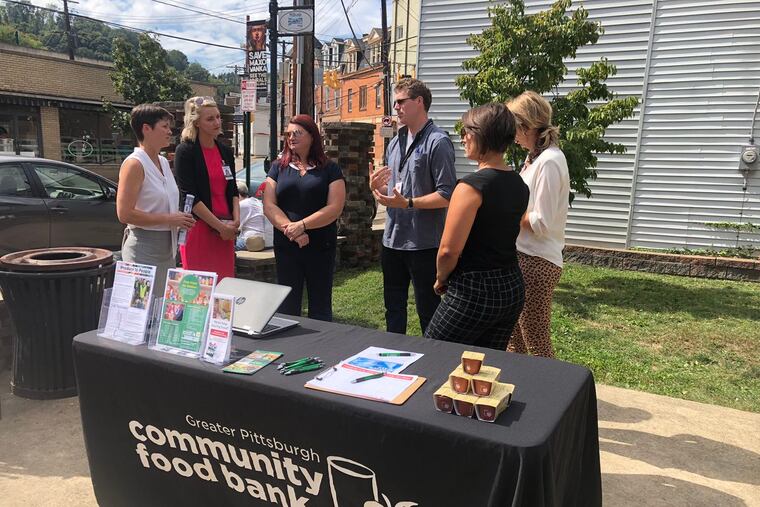The Trump administration’s attack on food stamps would hurt Pennsylvanians | Opinion
Pennsylvanians who rely on the program include about 700,000 children, about 690,000 people with disabilities, and about 185,000 older adults.

The Supplemental Nutrition Assistance Program (SNAP), previously known as food stamps, is the most important antihunger program in the country. It helps more than 1.8 million of our fellow Pennsylvanians — our friends, neighbors, and family members — put food on their tables. Those who rely on SNAP in Pennsylvania include about 700,000 children, about 690,000 people with disabilities, and about 185,000 older adults. SNAP is vital to helping Pennsylvanians meet their basic needs.
But the Trump administration announced in July that it will make it more difficult for those who rely on SNAP to get food, jeopardizing SNAP access for more than 120,000 Pennsylvania households — approximately 200,000 people. Now we’re staring down the potential fallout.
The administration is changing a policy called broad-based categorical eligibility (BBCE), and many states, including Pennsylvania, use this policy to extend food assistance benefits to more low-income families and individuals who would otherwise struggle to afford food. It is a commonsense policy that allows states some flexibility to determine appropriate income thresholds, which is important because the cost of living can be so significantly different from one state to another.
Right now, a Pennsylvania family of four are eligible for SNAP if they earn no more than about $40,000 a year. If the Trump administration gets its way and BBCE is drastically reduced, that family of four’s SNAP eligibility limit will drop from about $40,000 a year to no more than $32,000 a year. For elderly single-person households, the limit would change from approximately $24,000 a year to about $15,000. This change to BBCE will have the direct opposite effect of promoting economic mobility and promoting employment — this will destabilize families and make it harder for them to move out of poverty.
This rule change also means that more students would go hungry at school because they no longer qualify for free lunch. It means that our most vulnerable citizens — children, the elderly, and people with disabilities — will be disproportionately affected due to changes in their eligibility.
Let’s be very clear: Forcing already-struggling families to choose between putting food on their table or covering child care, rent, or other basic needs is unconscionable, and DHS vehemently opposes this change.
The ramifications of cutting SNAP go far beyond even taking food away from families. Purchases made through SNAP go directly back into the economy, and if the Trump administration’s plan goes through, that could equate to a loss of more than $200 million to $250 million per year to Pennsylvania retailers.
SNAP also helps people achieve better health by making high-quality, nutritious food affordable and reducing chronic hunger. This support in turn reduces Medicaid spending and improves long-term health outcomes. By changing the requirements to access SNAP, the Trump administration only perpetuates the cycle of poverty and creates more hungry families with greater health-care needs and higher health-care costs.
Every Human Services program — be it public assistance, physical and mental health care, early childhood education, or care for the elderly — is an investment in the public good for everyone. SNAP is an important safety-net program available to all people who need it. These services strengthen people, families, and communities, and there should be no shame or attacks for utilizing a service or receiving a benefit to meet basic needs, work to get ahead, and achieve a better life.
At DHS we want to help people achieve a better life without public assistance. But attacks on SNAP make it harder for us to make people’s lives better. Changes to BBCE do nothing to help people get off public assistance — they will only increase hunger across Pennsylvania and will disproportionately affect working families, individuals with disabilities, and seniors. It is cruel and unacceptable.
I’ve visited food banks and pantries around the commonwealth this year, learning about their work and the people they serve. They are incredible resources in their communities, but one thing is clear: They need SNAP. Without SNAP, our charitable food networks will not be able to meet the demand. We saw this increased strain earlier in 2019 during the federal government shutdown. We do not need to make things harder for people who are struggling.
If we want to build strong communities and break the cycle of intergenerational poverty, then we must invest in people, and this means supporting programs like SNAP. We strongly oppose any and all attacks on SNAP and will continue to fight against any attempt to take the program away from Pennsylvanians who need it.
Teresa Miller is secretary of the Pennsylvania Department of Human Services.